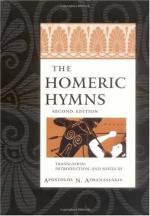About the place of composition, Cyprus or Asia Minor, the learned are no less divided than about the date. Many of the grounds on which their opinions rest appear unstable. The relations of Aphrodite to the wild beasts under her wondrous spell, for instance, need not be borrowed from Circe with her attendant beasts. If not of Homer’s age, the Hymn is markedly successful as a continuation of the Homeric tone and manner.
Modern Puritanism naturally “condemns” Aphrodite, as it “condemns” Helen. But Homer is lenient; Helen is under the spell of the Gods, an unwilling and repentant tool of Destiny; and Aphrodite, too, is driven by Zeus into the arms of a mortal. She is [Greek text], shamefast; and her adventure is to her a bitter sorrow (199, 200). The dread of Anchises—a man is not long of life who lies with a Goddess—refers to a belief found from Glenfinlas to Samoa and New Caledonia, that the embraces of the spiritual ladies of the woodlands are fatal to men. The legend has been told to me in the Highlands, and to Mr. Stevenson in Samoa, while my cousin, Mr. J. J. Atkinson, actually knew a Kaneka who died in three days after an amour like that of Anchises. The Breton ballad, Le Sieur Nan, turns on the same opinion. The amour of Thomas the Rhymer is a mediaeval analogue of the Idaean legend.
Aphrodite has better claims than most Greek Gods to Oriental elements. Herodotus and Pausanias (i. xiv. 6, iii. 23, I) look on her as a being first worshipped by the Assyrians, then by the Paphians of Cyprus, and Phoenicians at Askelon, who communicated the cult to the Cythereans. Cyprus is one of her most ancient sites, and Ishtar and Ashtoreth are among her Oriental analogues. She springs from the sea—
“The wandering waters knew
her, the winds and the viewless ways,
And the roses grew rosier, and bluer
the sea-blue streams of the
bays.”
But the charm of Aphrodite is Greek. Even without foreign influence, Greek polytheism would have developed a Goddess of Love, as did the polytheism of the North (Frigga) and of the Aztecs. The rites of Adonis, the vernal year, are, even in the name of the hero, Oriental. “The name Adonis is the Phoenician Adon, ‘Lord.’” {44} “The decay and revival of vegetation” inspires the Adonis rite, which is un-Homeric; and was superfluous, where the descent and return of Persephone typified the same class of ideas. To whatever extent contaminated by Phoenician influence, Aphrodite in Homer is purely Greek, in grace and happy humanity.




